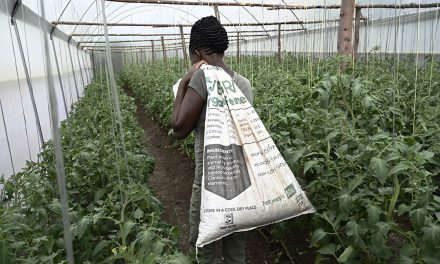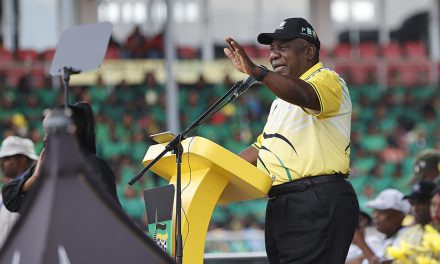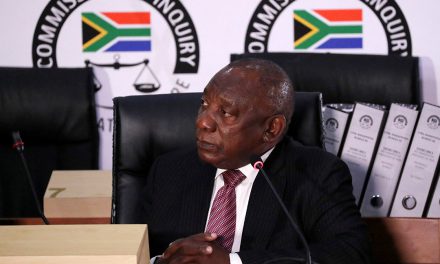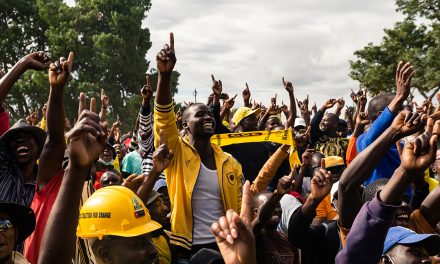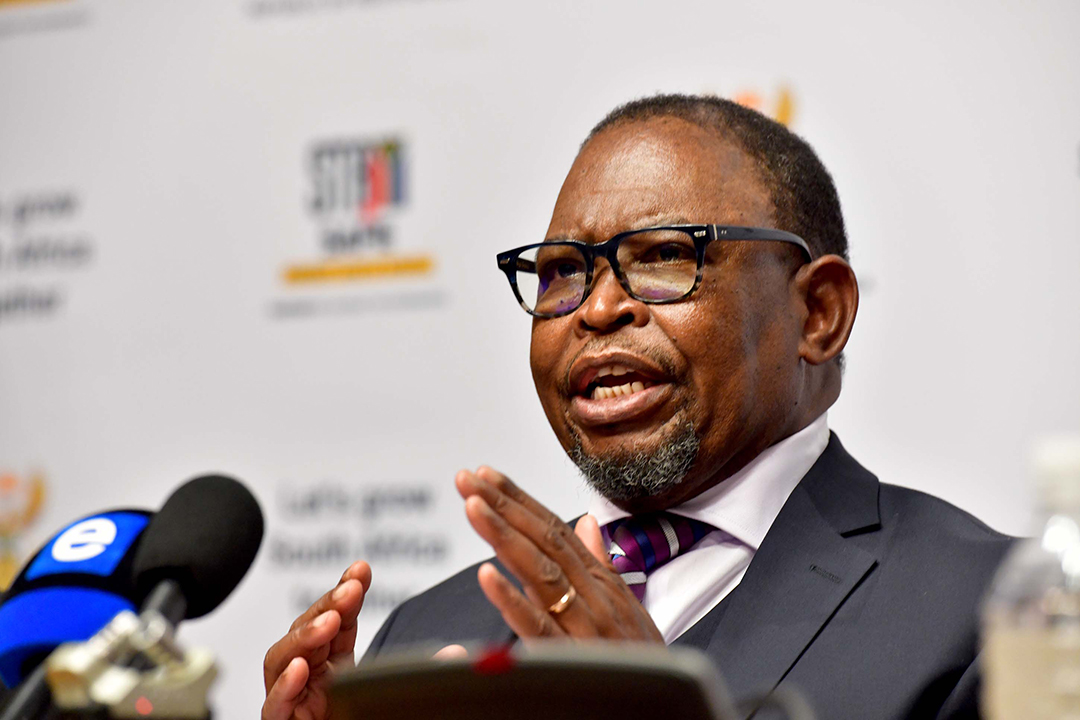
Finance Minister Enoch Godongwana addresses media ahead of the 2022 Budget Speech, 23 February 2022, at the Imbizo Media Centre in Cape Town ahead of the 2022 Budget Speech. Photo: GCIS
Finance Minister Enoch Godongwana’s maiden budget speech is being billed as good news. Overall tax revenue is estimated at R210 billion more than expected. In November last year, Godongwana only expected that amount to be R100 billion. A R210 billion windfall is roughly 12% of the overall budget – R1.73 trillion – but is a double-edged sword. Many economists have rightly asked the uncomfortable question: How sustainable is this budget, and how happy should we be about the higher-than-expected income?
First, our fiscal picture is not rosy by any stretch of the imagination. We are running a budget deficit of over 11% of GDP. This is especially concerning because debt servicing costs are now at 22% of the overall budget and the fastest-growing element of it. Every cent allocated towards servicing debt is a cent that cannot be spent on health, education, and infrastructure. This makes credit rating agencies fidgety. And how our debt is graded really matters for our growth potential. If our debt stays at junk grade, it is that much more expensive to service and that much more difficult to attract investment. Without investment, the economy cannot grow, and our intractable structural employment challenges cannot be addressed.
Second, the R210 billion windfall is driven largely by commodity price increases and the resultant increase in corporate tax revenue from mining companies. This is likely to prove unsustainable. South Africa’s minerals and metals portfolio is still overly dependent on, and subject to, the volatile global commodity price cycle. Increasingly, there is a split within commodities – those that are driven by fluctuating demand, and those that are structurally set to increase, driven by robust demand for new products. These products subsist in the broader realm of the global energy and transport revolutions pursuing a lower-carbon future.
For South Africa, this should be good news. We possess among the world’s highest reserves of chrome and manganese, and platinum group metals (PGMs). Chrome and manganese are critical ingredients for wind turbines, which now generate the cheapest form of renewable energy in the world. PGMs will be increasingly sought after as the hydrogen economy starts to grow, and so it was good to see some emphasis on this in the President’s state of the nation address a few weeks ago. However, over the last decade, South Africa has proved incapable of attracting the kind of exploration investment required to build up a sustainable supply pipeline of these minerals and metals to feed global demand.
Even if mining tax revenues were to continue to grow for the next few years, we must face the fact that mining is increasingly less labour-absorptive than it used to be. For the environment and workers, this is undoubtedly a good thing. Less environmentally invasive, tech-driven mining increases margins and avoids the need to send workers down into atrocious conditions. However, the country has to have a clear strategy to connect mining to green industrialisation. In other words, what we mine – and plan to mine – must tap into global value chains for products such as solar panels, wind turbines, electric vehicles and hydrogen fuel cells. This will grow the industrial tax base in a more sustainable manner and provide the missing employment link.
Third, our tax base remains too narrow. This is perhaps the most crucial fiscal challenge facing South Africa. The public sector wage bill is roughly 40% higher than total personal income tax revenue. Moreover, a very small proportion (27.5%) of registered taxpayers are expected to submit tax returns this year. That is literally 6.3 million people. Of those, only 1.6 million provide more than half of the total income. The number is dwindling, especially in the wake of the July insurrection that affected large parts of KZN and some parts of Gauteng last year. To boot, 18 million South Africans are dependent on welfare grants of some kind or another. This is the very definition of an unsustainable situation: A tiny proportion of taxpayers funding a welfare bill worth R222 billion (over 3% of GDP).
Read MoreFourth, our state-owned enterprises (SOEs) remain a drain on the fiscus. Eskom is in debt to the tune of nearly R500 billion. Over half of this is ‘toxic’ – in other words, it should be written off. The Zondo Commission findings have shown in sordid detail how SOEs have been skilfully deployed as rent-seeking missiles, destroying productive and maintenance capacity. None of the major SOEs has received a clean audit in the last ten years. This problem is located within the broader challenge of the country’s decaying infrastructure
Read MoreWithout functional power, road and rail networks, and a skilled workforce, we do not possess the ‘initial conditions’ by which to attract sustainable foreign direct investment. The state must get serious about public-private partnerships now – private enterprise, disciplined by the market, needs to operate and maintain the major public infrastructure. Eskom also needs to be split up into independent generation, transmission and distribution units, as per the now-never-mentioned Independent Systems and Market Operator Bill.
Moreover, without political stability and a clear-headed economic strategy, we are unlikely to attain said conditions. For as long as fiscal and monetary policy decisions are driven by political considerations (public sector wage demands, among others) rather than by the strategic sustainability concerns of the country, we are in for a rough ride.
Read MoreSo, what is to be done to effect better governance?
First, real accountability needs to be established. Perpetrators of corruption need to be credibly assured that indiscretion will lead to prosecution. The Zondo Commission findings need to lead to prosecutions that send an unequivocal signal to those who loot the public purse that jail time is a real risk. This also sends a corollary signal to the market that investment contracts will be credibly honoured and that business deals are not dependent on dodgy side payments to government officials.
Second, the state needs to stop paying lip service to reducing red tape for small businesses and execute swiftly on this. A related challenge is that too many businesses are dependent on the state for tenders, an indication that we are not doing enough to encourage private enterprise growth.
Finally, we need a slightly more expansionary monetary policy even while we tighten the fiscal belt (stop bailing out failing SOEs and wasting public money). In other words, the Monetary Policy Committee of the Reserve Bank needs to think about keeping interest rates steady to afford more disposable income to taxpayers and make local capital less expensive for investors. Expenditure and investment injections into the economy have positive multiplier effects that are especially needed in the wake of last year’s economic insurrection-driven devastation. A ballooning current oil price thanks to Putin’s pig-headedness in the Ukraine makes this equation more difficult, but we must stick to our guns and make clear to the market what it can expect.
Godongwana has been granted some fiscal room, but he should not be tempted into thinking that this is genuine respite. A solid budget speech on Wednesday will be honest about the challenges and not gloss over them. This would provide confidence to South Africans and the global market that our rose-tinted glasses are off and hard decisions are being made to ensure sustainability.
Read More Read MoreThis article first appeared in Business Day.
[activecampaign form=1]
Dr Ross Harvey is a natural resource economist and policy analyst, and he has been dealing with governance issues in various forms across this sector since 2007. He has a PhD in economics from the University of Cape Town, and his thesis research focused on the political economy of oil and institutional development in Angola and Nigeria. While completing his PhD, Ross worked as a senior researcher on extractive industries and wildlife governance at the South African Institute of International Affairs (SAIIA), and in May 2019 became an independent conservation consultant. Ross’s task at GGA is to establish a non-renewable natural resources project (extractive industries) to ensure that the industry becomes genuinely sustainable and contributes to Africa achieving the Sustainable Development Goals (SDGs). Ross was appointed Director of Research and Programmes at GGA in May 2020.


